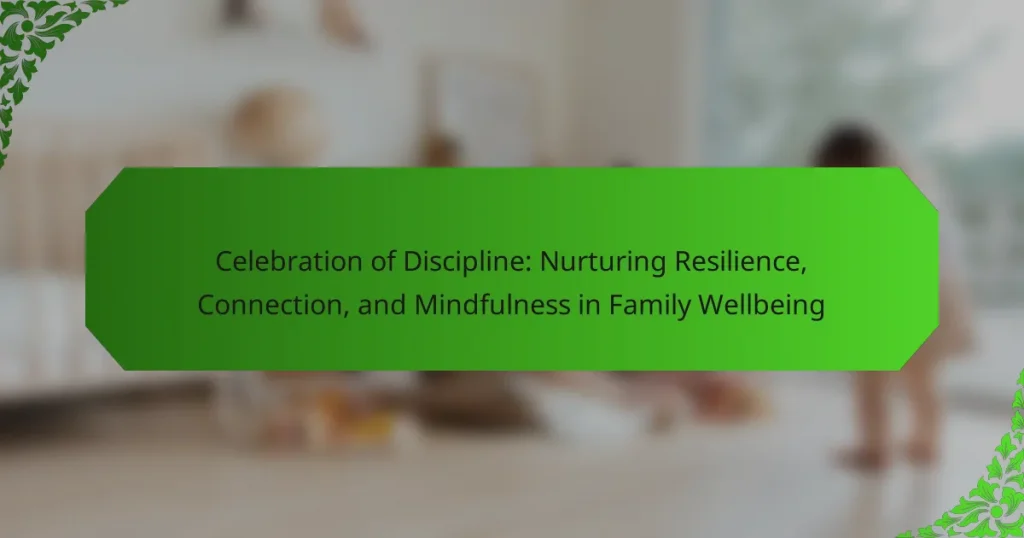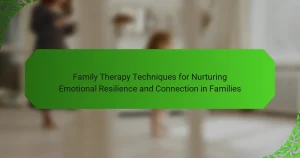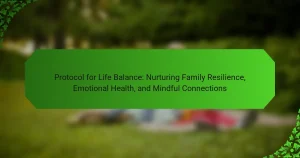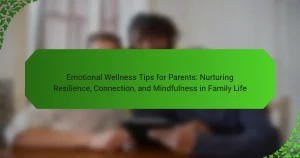Enhancing family wellbeing is crucial for navigating life’s challenges. The Celebration of Discipline fosters mindfulness, connection, and resilience through practices like meditation and service. These disciplines promote emotional regulation and deeper family bonds. Families engaging in these activities report increased satisfaction and unity, essential for a supportive environment.
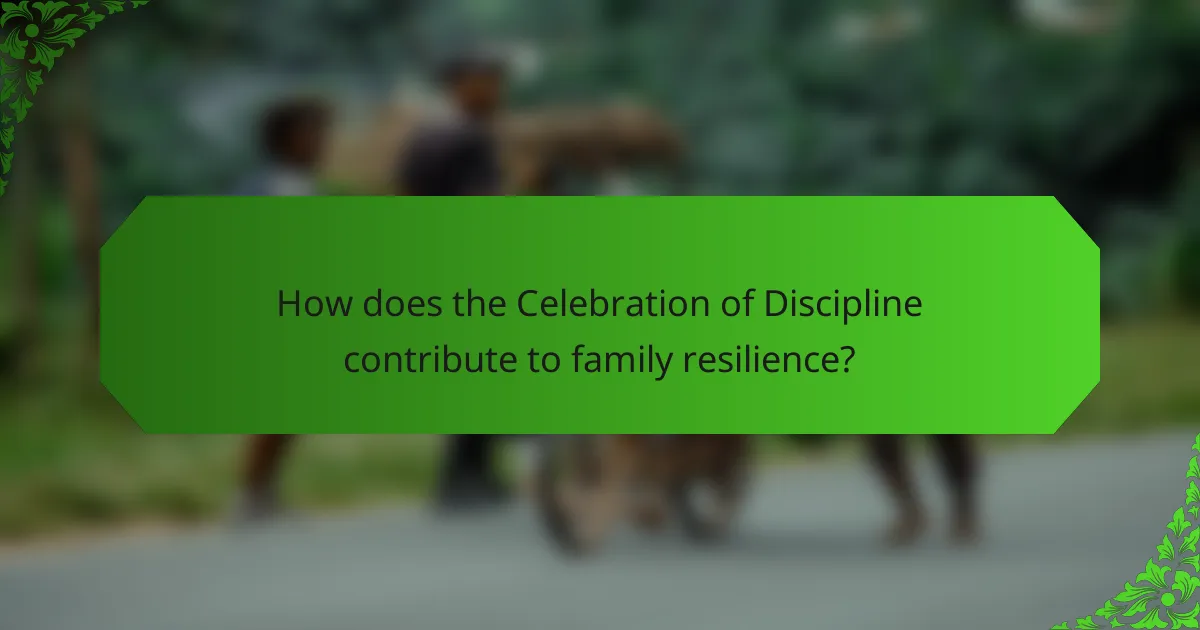
How does the Celebration of Discipline contribute to family resilience?
The Celebration of Discipline enhances family resilience by fostering mindfulness, connection, and spiritual growth. Engaging in practices such as meditation, prayer, and service cultivates deeper family bonds. These disciplines promote emotional well-being, helping families navigate challenges together. Research indicates that families practicing these disciplines report higher levels of satisfaction and unity.
What are the core principles of the Celebration of Discipline?
The core principles of the Celebration of Discipline focus on fostering resilience, connection, and mindfulness in family wellbeing. These principles include the practice of various spiritual disciplines such as meditation, prayer, and service, which nurture deeper connections among family members. Emphasizing simplicity, these practices encourage mindfulness and intentional living, promoting a sense of community and support. Additionally, they cultivate resilience by helping families navigate challenges together, strengthening their bonds through shared experiences and mutual understanding.
How can families practice resilience through discipline?
Families can practice resilience through discipline by establishing consistent routines, fostering open communication, and encouraging self-regulation. These practices create a stable environment that promotes emotional strength and connection.
Establishing routines helps children understand expectations and develop a sense of security. Consistent family activities, such as weekly game nights, reinforce bonds and provide opportunities for shared experiences.
Open communication allows family members to express feelings and concerns. This transparency builds trust and enables problem-solving, essential for overcoming challenges together.
Encouraging self-regulation teaches children to manage their emotions and responses. Techniques such as mindfulness exercises or goal-setting can foster resilience by empowering them to navigate difficulties effectively.
What specific activities foster resilience in family life?
Engaging in specific activities fosters resilience in family life, such as open communication, shared rituals, and collaborative problem-solving. These practices enhance emotional bonds and create a supportive environment. For example, regular family meetings can encourage transparency and collective decision-making. Celebrating achievements together reinforces a sense of unity and shared purpose. Mindfulness exercises, like family meditation or outdoor activities, promote emotional regulation and connection. These strategies collectively nurture resilience, fostering a healthier family dynamic.
How can discipline create a supportive family environment?
Discipline fosters a supportive family environment by establishing clear expectations and promoting accountability. It nurtures resilience through consistent routines, enhancing emotional stability. Families practicing discipline build stronger connections, as shared values create trust and understanding. Mindfulness in discipline encourages open communication, allowing members to express feelings and resolve conflicts effectively.
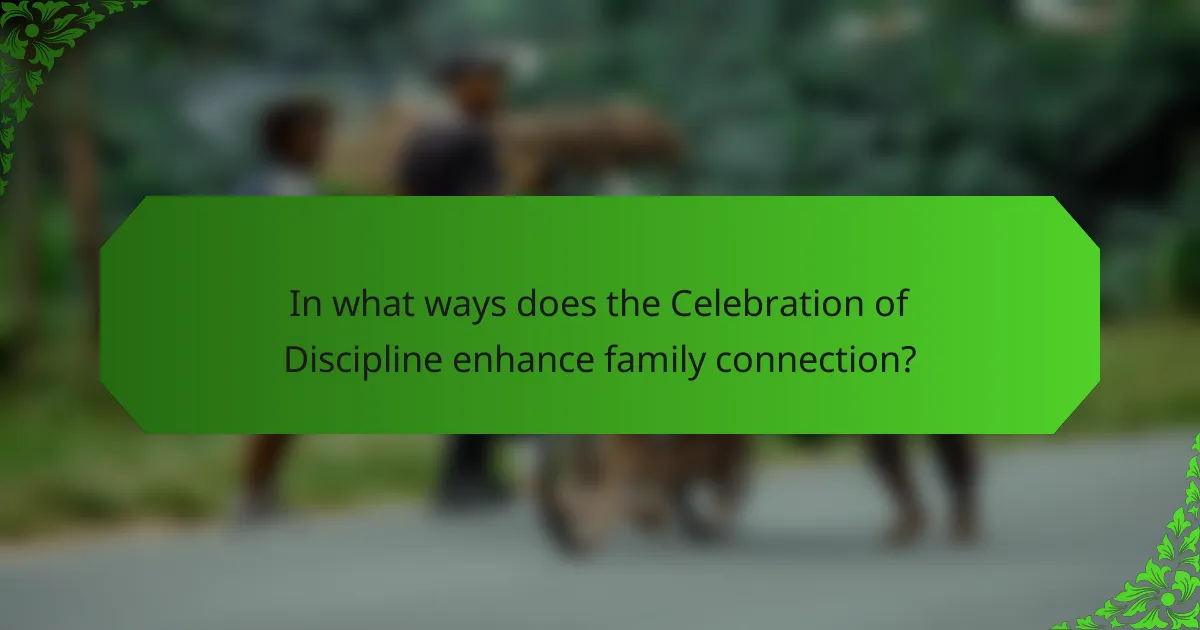
In what ways does the Celebration of Discipline enhance family connection?
The Celebration of Discipline enhances family connection by fostering shared practices that promote resilience and mindfulness. Engaging in disciplines such as meditation, service, and study cultivates deeper understanding among family members. This collective participation strengthens emotional bonds and encourages open communication. As a result, families experience increased trust and support, essential for navigating challenges together.
What role does shared practice play in strengthening family bonds?
Shared practice significantly strengthens family bonds by fostering connection and resilience. Engaging in shared activities, such as family meals or recreational outings, nurtures communication and emotional support. These experiences create a sense of belonging and shared identity among family members. Research shows that families who practice shared rituals report higher levels of satisfaction and cohesion. Regular shared practices promote mindfulness, allowing families to cultivate deeper relationships and navigate challenges together.
How can families create rituals around discipline?
Families can create rituals around discipline by establishing consistent practices that promote resilience and connection. Rituals such as family meetings, consistent consequences, and positive reinforcement foster a supportive environment. Engaging in shared activities reinforces family bonds, making discipline a collaborative process. These practices help children understand expectations while nurturing mindfulness and emotional awareness.
What are effective family rituals that promote connection?
Effective family rituals that promote connection include shared meals, game nights, and storytelling sessions. These activities enhance bonding and foster resilience. Regular family meetings also provide a platform for open communication. Engaging in mindfulness practices together can deepen emotional connections.
How can communication improve through disciplined practices?
Disciplined communication practices enhance family wellbeing by fostering resilience, connection, and mindfulness. Consistent dialogue nurtures emotional bonds and promotes understanding among family members. As a result, families can navigate challenges more effectively, leading to improved relationships. Engaging in regular family meetings or check-ins can establish a routine that reinforces these practices, ensuring everyone feels heard and valued.
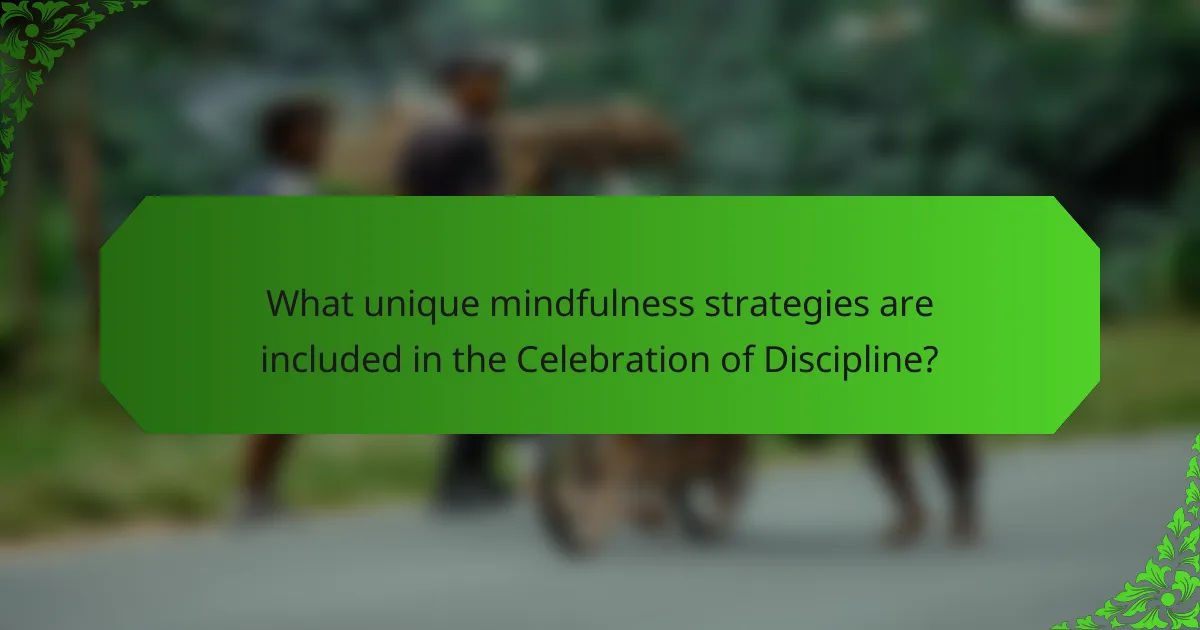
What unique mindfulness strategies are included in the Celebration of Discipline?
The Celebration of Discipline includes unique mindfulness strategies such as solitude, submission, and service. Solitude fosters deep reflection and personal growth, while submission encourages letting go of control and embracing community. Service promotes connection through selfless acts, enhancing family wellbeing. These strategies cultivate resilience and mindfulness, supporting a balanced family dynamic.
How can mindfulness be integrated into daily family routines?
Integrating mindfulness into daily family routines enhances connection and resilience. Families can practice mindfulness through shared activities like mindful meals, where everyone focuses on the taste and texture of food. Another approach is to establish a daily gratitude practice, encouraging family members to express appreciation for each other. Incorporating short mindfulness breaks during the day, such as deep breathing exercises or nature walks, can also foster a sense of calm and presence. Lastly, creating a family mindfulness jar filled with prompts can inspire spontaneous moments of reflection and connection throughout the week.
What are the benefits of mindfulness for family mental wellbeing?
Mindfulness enhances family mental wellbeing by fostering emotional regulation, reducing stress, and improving communication. Families practicing mindfulness experience stronger connections and resilience against challenges. Research indicates that mindfulness can decrease anxiety levels by up to 30%, promoting a more harmonious family environment. Additionally, engaging in mindfulness activities together cultivates shared experiences, deepening bonds and enhancing overall family dynamics.
What mindfulness exercises are suitable for families?
Mindfulness exercises suitable for families include breathing techniques, guided imagery, and mindful walking. These activities foster connection and resilience while promoting overall family wellbeing.
1. Breathing Techniques: Encourage deep, slow breaths to enhance relaxation and awareness.
2. Guided Imagery: Use visualization to create calming mental images, enhancing emotional connection.
3. Mindful Walking: Engage in walks focusing on the sensations of movement and the environment, promoting presence and unity.
4. Gratitude Journaling: Families can document daily gratitude, reinforcing positive connections and mindfulness.
5. Body Scan: Practice awareness of bodily sensations, helping family members connect with their feelings and each other.
6. Mindful Cooking: Involve the family in preparing meals mindfully, focusing on ingredients and processes to enhance togetherness.
How can families measure the impact of mindfulness on their wellbeing?
Families can measure the impact of mindfulness on their wellbeing through regular reflections and assessments. Tracking emotional changes, stress levels, and family interactions provides insights into mindfulness effectiveness. Unique attributes such as improved communication and resilience can be linked to mindfulness practices. Regular family discussions about experiences can deepen connections and enhance overall wellbeing.
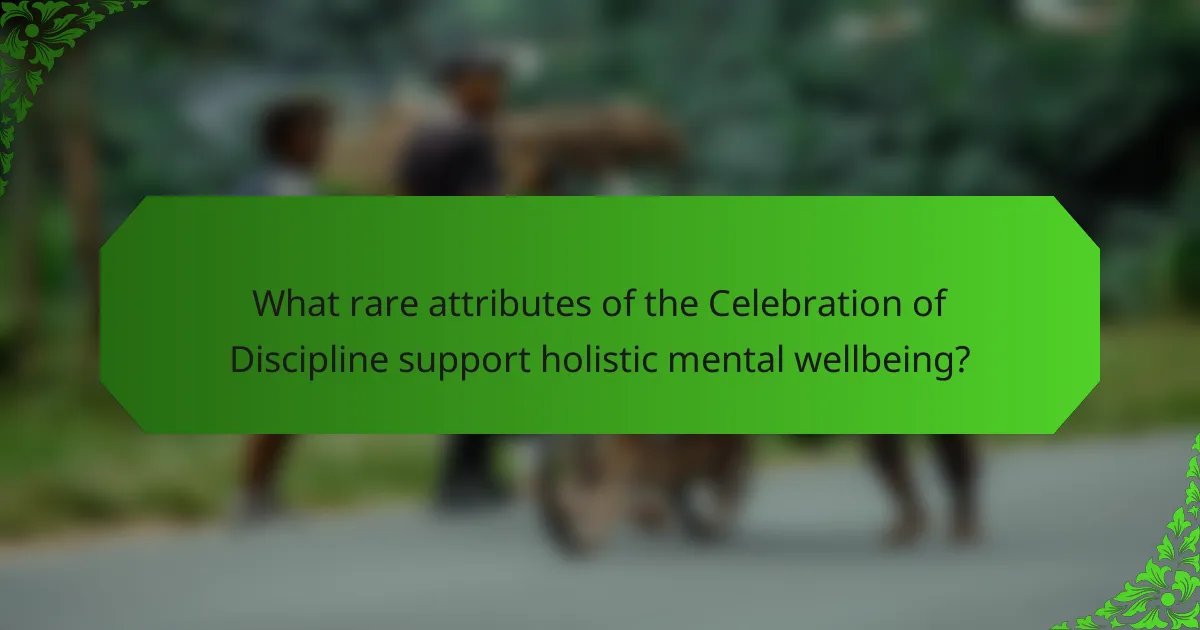
What rare attributes of the Celebration of Discipline support holistic mental wellbeing?
The rare attributes of the Celebration of Discipline enhance holistic mental wellbeing through fostering deep personal reflection and cultivating community ties. This practice emphasizes unique forms of intake like solitude and service, which promote resilience and mindfulness. Engaging in these disciplines can lead to improved emotional regulation and stronger family connections. As a result, individuals experience a profound sense of belonging and purpose, contributing to overall mental health.
How does the Celebration of Discipline differ from other wellbeing approaches?
The Celebration of Discipline emphasizes structured practices for resilience and mindfulness, setting it apart from other wellbeing approaches. Unlike many modern methods that focus on spontaneous self-care, this approach integrates intentional disciplines such as meditation, service, and study. These practices foster deep connections within families and promote a holistic sense of wellbeing. Additionally, the Celebration of Discipline uniquely combines spiritual and practical elements, enhancing personal growth and family dynamics.
What unique challenges do families face when implementing these practices?
Families face unique challenges when implementing practices from “Celebration of Discipline.” Key difficulties include resistance to change, time management, and varying levels of commitment among family members. Resistance often arises from established habits, making it hard to adopt new routines. Time management becomes crucial as families juggle multiple responsibilities, which can hinder consistent practice. Additionally, differing levels of interest and engagement in mindfulness and resilience activities can create friction, necessitating tailored approaches to foster inclusion and motivation. These challenges require patience and adaptability to cultivate a supportive environment for family wellbeing.
How can families overcome obstacles to discipline and mindfulness?
Families can overcome obstacles to discipline and mindfulness by fostering open communication and setting shared goals. Establishing routines that incorporate mindfulness practices helps create a supportive environment. Engaging in activities together, such as family meetings or mindfulness exercises, strengthens connections and promotes resilience. Regular reflection on family dynamics encourages adaptability and reinforces commitment to shared values.
What uncommon insights can enhance the effectiveness of the Celebration of Discipline?
Incorporating uncommon insights can significantly enhance the effectiveness of the Celebration of Discipline. One insight is the integration of nature-based activities, which fosters resilience and mindfulness. Engaging with natural environments encourages family bonding and promotes mental well-being. Another insight is the practice of gratitude journaling; it strengthens connections among family members and cultivates a positive mindset. Additionally, exploring diverse cultural disciplines can enrich the experience, allowing families to appreciate various perspectives on mindfulness and discipline. These insights create a more holistic approach to nurturing family well-being.

What actionable tips can families apply for better mental wellbeing?
Families can enhance mental wellbeing by practicing mindfulness, fostering connections, and celebrating resilience. Incorporate regular family activities that promote open communication, such as weekly check-ins or shared meals. Establish routines that include mindfulness exercises, like meditation or yoga, to reduce stress. Encourage each family member to express gratitude, which strengthens bonds and enhances positivity. Create a supportive environment where challenges are discussed openly, fostering resilience through shared experiences.
What common mistakes should families avoid when practicing discipline?
Families should avoid inconsistency, harshness, neglecting emotional needs, and failing to model desired behaviors when practicing discipline. Consistency in discipline reinforces boundaries, while harshness can lead to fear rather than respect. Addressing emotional needs fosters connection and understanding. Modeling desired behaviors demonstrates accountability and reinforces lessons.
How can families optimize their approach to resilience and connection?
Families can optimize resilience and connection by implementing structured mindfulness practices and fostering open communication. Regular family activities, such as shared meals or game nights, enhance bonding and emotional support. Establishing routines promotes stability, while encouraging individual expression nurtures personal growth. Mindfulness exercises, like meditation or nature walks, can strengthen family ties and improve collective resilience. Prioritizing emotional check-ins allows members to share feelings, fostering a deeper understanding and connection.
What expert insights can guide families in their journey towards holistic wellbeing?
Expert insights emphasize the importance of resilience, connection, and mindfulness for family wellbeing. Practicing regular family rituals fosters emotional bonds. Engaging in shared mindfulness activities enhances presence and reduces stress. Encouraging open communication nurtures resilience, allowing families to navigate challenges together. Integrating these practices creates a supportive environment, essential for holistic wellbeing.
